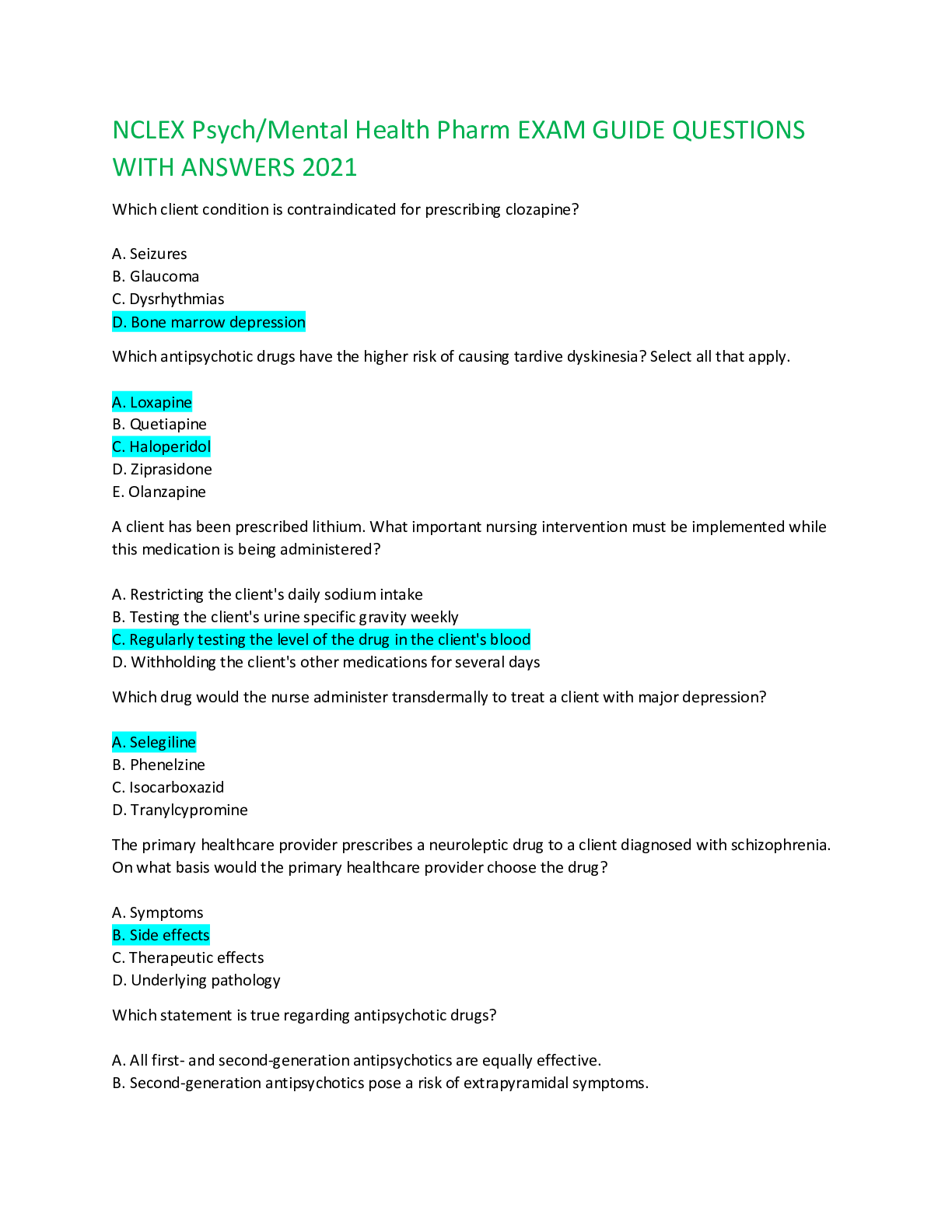NCLEX- COMPREHENSIVE MENTAL HEALTH QUESTIONS, ANSWERS AND RATIONALES
Document Content and Description Below
NCLEX- COMPREHENSIVE MENTAL HEALTH QUESTIONS, ANSWERS AND RATIONALES .A psychotic client reports to the evening nurse that the day nurse put something suspicious in his water with his medication. T... he nurse replies, "You're worried about your medication?" The nurse's communication is: A. an example of presenting reality. B. reinforcing the client's delusions. C. focusing on emotional content. D. a nontherapeutic technique called mind reading. Rationale: The nurse should help the client focus on the emotional content rather than delusional material. Presenting reality isn't helpful because it can lead to confrontation and disengagement. Agreeing with the client and supporting his beliefs are reinforcing delusions. Mind reading isn't therapeutic. 2. A client is admitted to the inpatient unit of the mental health center with a diagnosis of paranoid schizophrenia. He's shouting that the government of France is trying to assassinate him. Which of the following responses is most appropriate? A. "I think you're wrong. France is a friendly country and an ally of the United States. Their government wouldn't try to kill you." B. "I find it hard to believe that a foreign government or anyone else is trying to hurt you. You must feel frightened by this." C. "You're wrong. Nobody is trying to kill you." D. "A foreign government is trying to kill you? Please tell me more about it." Rationale: Responses should focus on reality while acknowledging the client's feelings. Arguing with the client or denying his belief isn't therapeutic. Arguing can also inhibit development of a trusting relationship. Continuing to talk about delusions may aggravate the psychosis. Asking the client if a foreign government is trying to kill him may increase his anxiety level and can reinforce his delusions. 3. Propranolol (Inderal) is used in the mental health setting to manage which of the following conditions? A. Antipsychotic-induced akathisia and anxiety B. The manic phase of bipolar illness as a mood stabilizer C. Delusions for clients suffering from schizophrenia D. Obsessive-compulsive disorder (OCD) to reduce ritualistic behavior Rationale: Propranolol is a potent beta-adrenergic blocker and produces a sedating effect; therefore, it's used to treat antipsychotic induced akathisia and anxiety. Lithium (Lithobid) is used to stabilize clients with bipolar illness. Antipsychotics are used to treat delusions. Some antidepressants have been effective in treating OCD. 4. A client with borderline personality disorder becomes angry when he is told that today's psychotherapy session with the nurse will be delayed 30 minutes because of an emergency. When the session finally begins, the client expresses anger. Which response by the nurse would be most helpful in dealing with the client's anger? A. "If it had been your emergency, I would have made the other client wait." B. "I know it's frustrating to wait. I'm sorry this happened." C. "You had to wait. Can we talk about how this is making you feel right now?" D. "I really care about you and I'll never let this happen again." Rationale: This response may diffuse the client's anger by helping to maintain a therapeutic relationship and addressing the client's feelings. Option A wouldn't address the client's anger. Option B is incorrect because the client with a borderline personality disorder blames others for things that happen, so apologizing reinforces the client's misconceptions. The nurse can't promise that a delay will never occur again, as in option D, because such matters are outside the nurse's control. 5. How soon after chlorpromazine (Thorazine) administration should the nurse expect to see a client's delusional thoughts and hallucinations eliminated A. Several minutes B. Several hours C. Several days D. Several weeks Rationale: Although most phenothiazines produce some effects within minutes to hours, their antipsychotic effects may take several weeks to appear. 6. A client receiving haloperidol (Haldol) complains of a stiff jaw and difficulty swallowing. The nurse's first action is to: A. Reassure the client and administer as needed lorazepam (Ativan) I.M. B. Administer as needed dose of benztropine (Cogentin) I.M. as ordered. C. Administer as needed dose of benztropine (Cogentin) by mouth as ordered. D. Administer as needed dose of haloperidol (Haldol) by mouth. Rationale: The client is most likely suffering from muscle rigidity due to haloperidol. I.M. benztropine should be administered to prevent asphyxia or aspiration. Lorazepam treats anxiety, not extrapyramidal effects. Another dose of haloperidol would increase the severity of the reaction. 7. A client with a diagnosis of paranoid schizophrenia comments to the nurse, "How do I know what is really in those pills?" Which of the following is the best response? A. Say, "You know it's your medicine." B. Allow him to open the individual wrappers of the medication. C. Say, "Don't worry about what is in the pills. It's what is ordered." D. Ignore the comment because it's probably a joke. Rationale: Option B is correct because allowing a paranoid client to open his medication can help reduce suspiciousness. Option A is incorrect because the client doesn't know that it's his medication and he's obviously suspicious. Telling the client not to worry or ignoring the comment isn't supportive and doesn't offer reassurance. 8. The nurse is caring for a client with schizophrenia who experiences auditory hallucinations. The client appears to be listening to someone who isn't visible. He gestures, shouts angrily, and stops shouting in mid-sentence. Which nursing intervention is the most appropriate? A. Approach the client and touch him to get his attention. B. Encourage the client to go to his room where he'll experience fewer distractions. C. Acknowledge that the client is hearing voices but make it clear that the nurse doesn't hear these voices. D. Ask the client to describe what the voices are saying. Rationale: By acknowledging that the client hears voices, the nurse conveys acceptance of the client. By letting the client know that the nurse doesn't hear the voices, the nurse avoids reinforcing the hallucination. The nurse shouldn't touch the client with schizophrenia without advance warning. The hallucinating client may believe that the touch is a threat or act of aggression and respond violently. Being alone in his room encourages the client to withdraw and may promote more hallucinations. The nurse should provide an activity to distract the client. By asking the client what the voices are saying, the nurse is reinforcing the hallucination. The nurse should focus on the client's feelings, rather than the content of the hallucination. 9. Yesterday, a client with schizophrenia began treatment with haloperidol (Haldol). Today, the nurse notices that the client is holding his head to one side and complaining of neck and jaw spasms. What should the nurse do? A. Assume that the client is posturing. B. Tell the client to lie down and relax. C. Evaluate the client for adverse reactions to haloperidol. D. Put the client on the list for the physician to see tomorrow Rationale: An antipsychotic agent, such as haloperidol, can cause muscle spasms in the neck, face, tongue, back, and sometimes legs as well as torticollis (twisted neck position). The nurse should be aware of these adverse reactions and assess for related reactions promptly. Although posturing may occur in clients with schizophrenia, it isn't the same as neck and jaw spasms. Having the client relax can reduce tension-induced muscle stiffness but not drug-induced muscle spasms. When a client develops a new sign or symptom, the nurse should consider an adverse drug reaction as the possible cause and obtain treatment immediately, rather than have the client wait. 10. A client with paranoid schizophrenia has been experiencing auditory hallucinations for many years. One approach that has proven to be effective for hallucinating clients is to: A. take an as-needed dose of psychotropic medication whenever they hear voices. B. practice saying "Go away" or "Stop" when they hear voices. C. sing loudly to drown out the voices and provide a distraction. D. go to their room until the voices go away. Rationale: Researchers have found that some clients can learn to control bothersome hallucinations by telling the voices to go away or stop. Taking an as needed dose of psychotropic medication whenever the voices arise may lead to overmedication and put the client at risk for adverse effects. Because the voices aren't likely to go away permanently, the client must learn to deal with the hallucinations without relying on drugs. Although distraction is helpful, singing loudly may upset other clients and would be socially unacceptable after the client is discharged. Hallucinations are most bothersome in a quiet environment when the client is alone, so sending the client to his room would increase, rather than decrease, the hallucinations. 11. A client with catatonic schizophrenia is mute, can't perform activities of daily living, and stares out the window for hours. What is the nurse's first priority? A. Assist the client with feeding. B. Assist the client with showering. C. Reassure the client about safety. D. Encourage socialization with peers. Rationale: According to Maslow's hierarchy of needs, the need for food is among the most important. Other needs, in order of decreasing importance, include hygiene, safety, and a sense of belonging. 12. A client tells the nurse that the television newscaster is sending a secret message to her. The nurse suspects the client is experiencing: A. a delusion. B. flight of ideas. C. ideas of reference. D. a hallucination. CONTINUED,...............DOWNLOAD FOR BEST SCORES [Show More]
Last updated: 1 year ago
Preview 1 out of 36 pages

Reviews( 0 )
Document information
Connected school, study & course
About the document
Uploaded On
Oct 21, 2022
Number of pages
36
Written in
Additional information
This document has been written for:
Uploaded
Oct 21, 2022
Downloads
0
Views
34

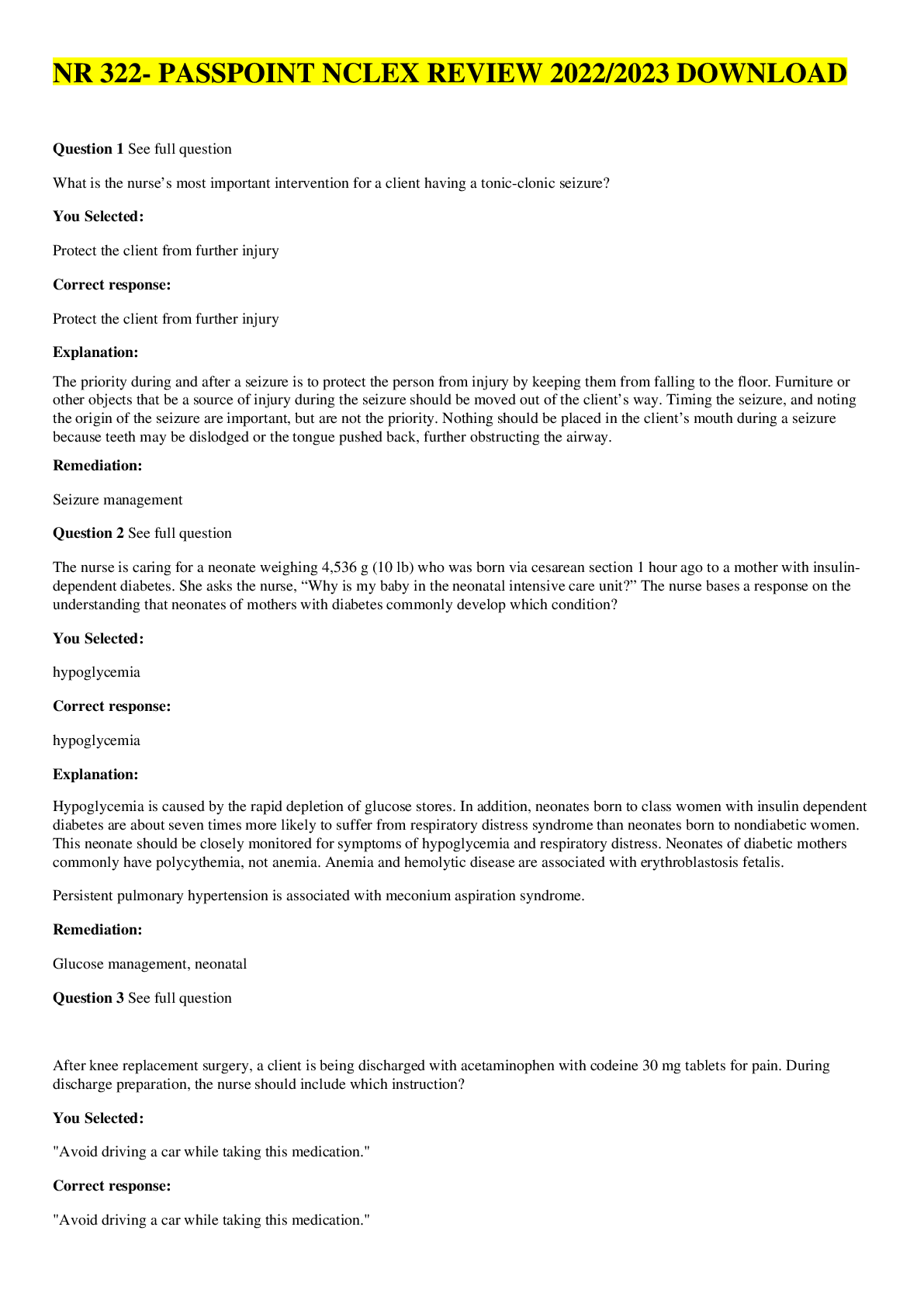
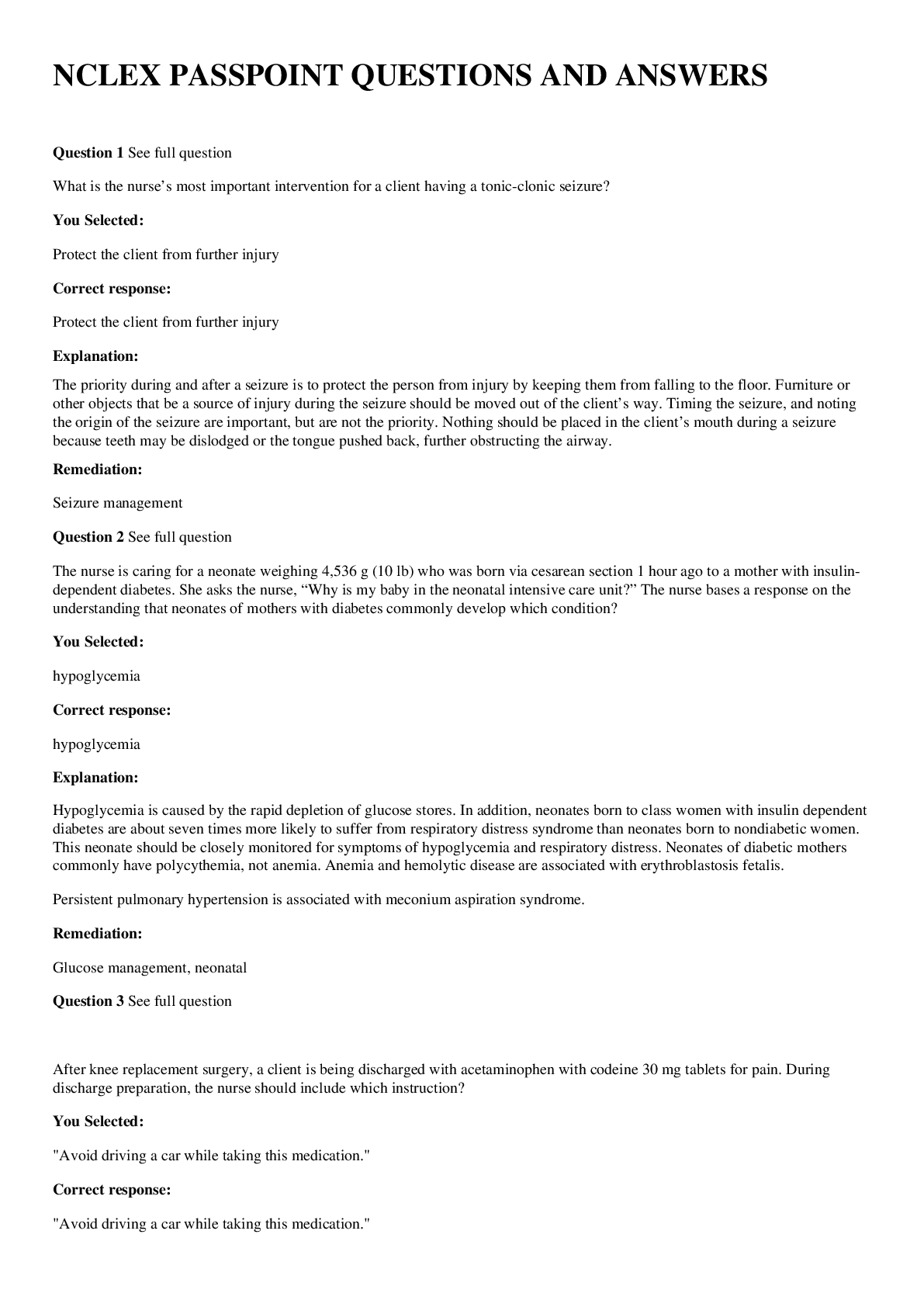




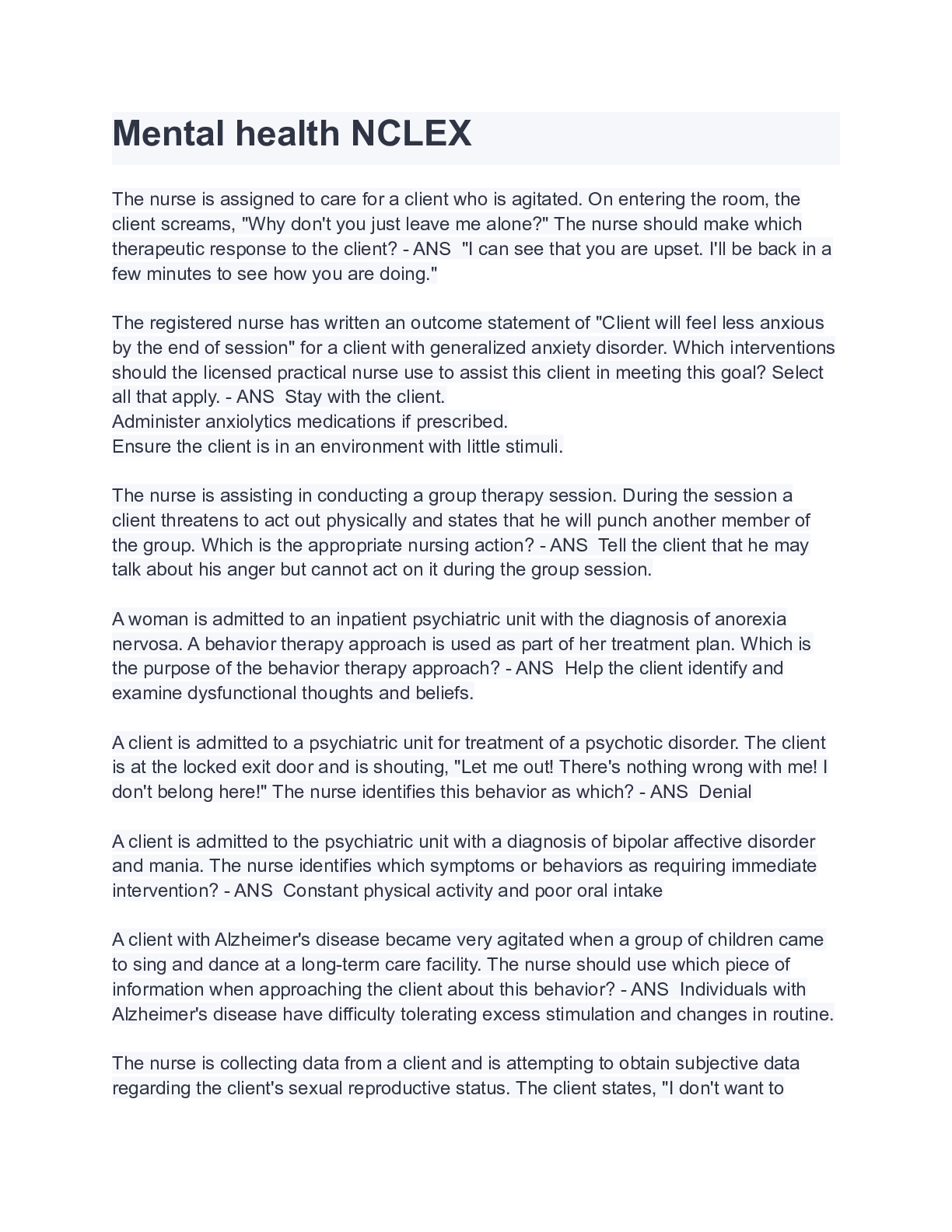
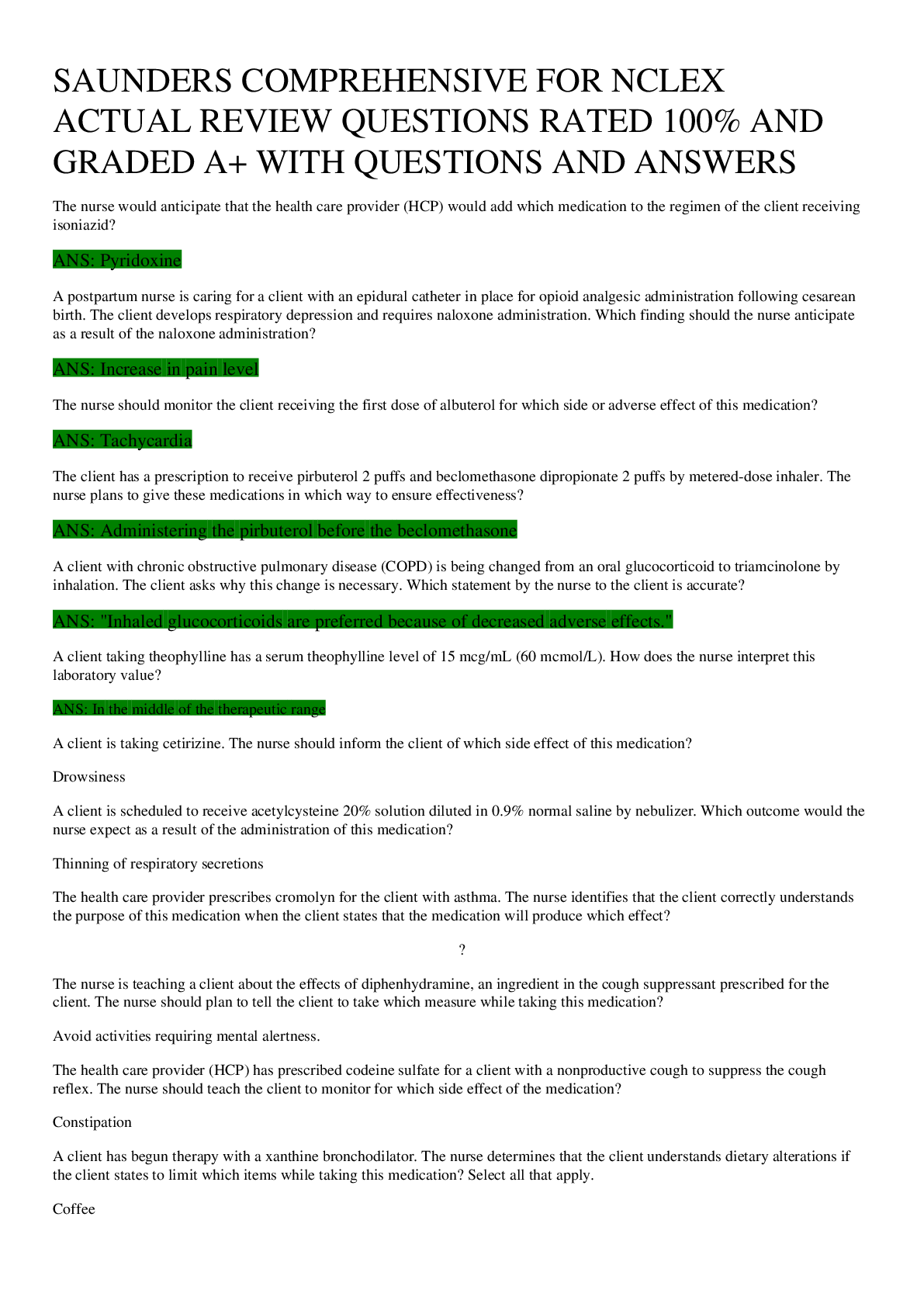
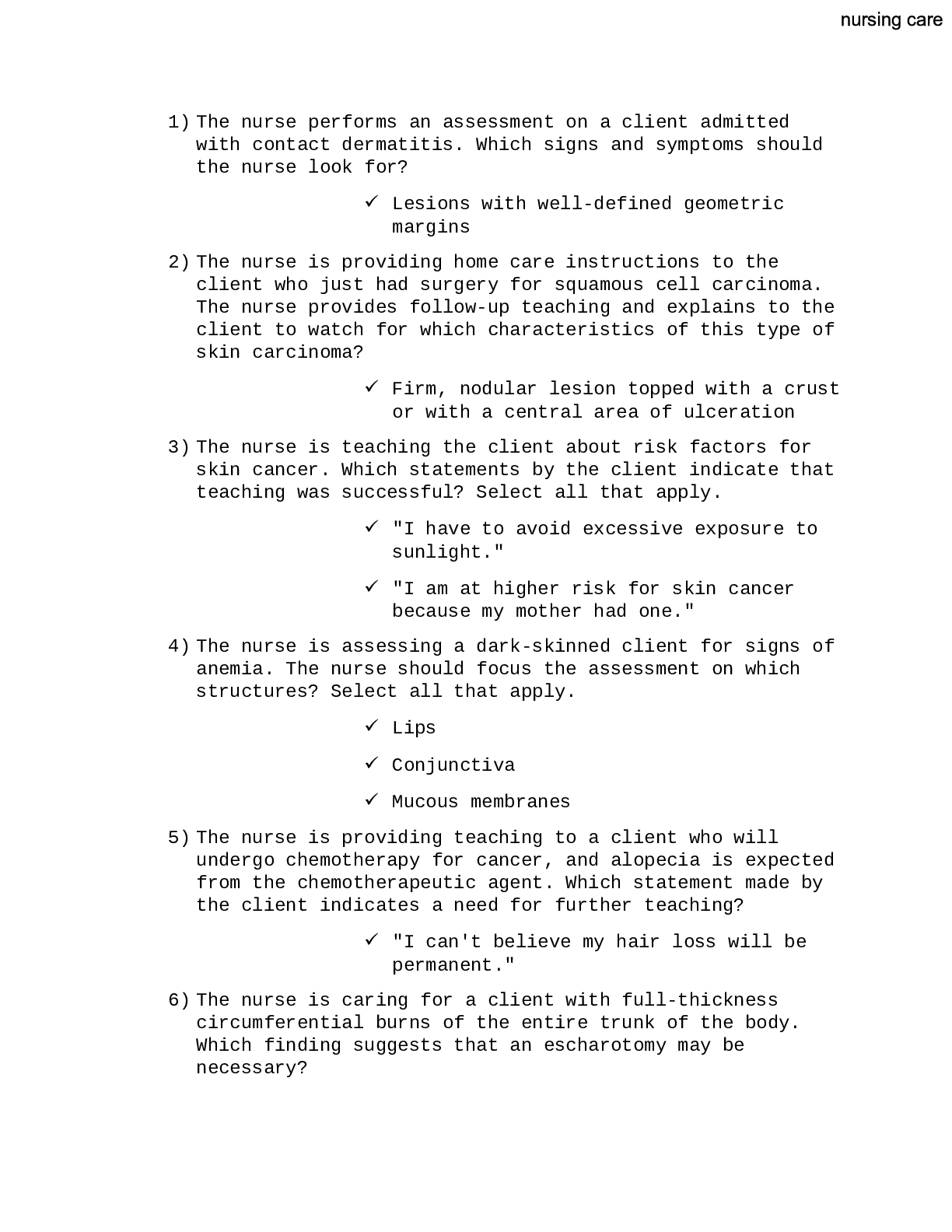

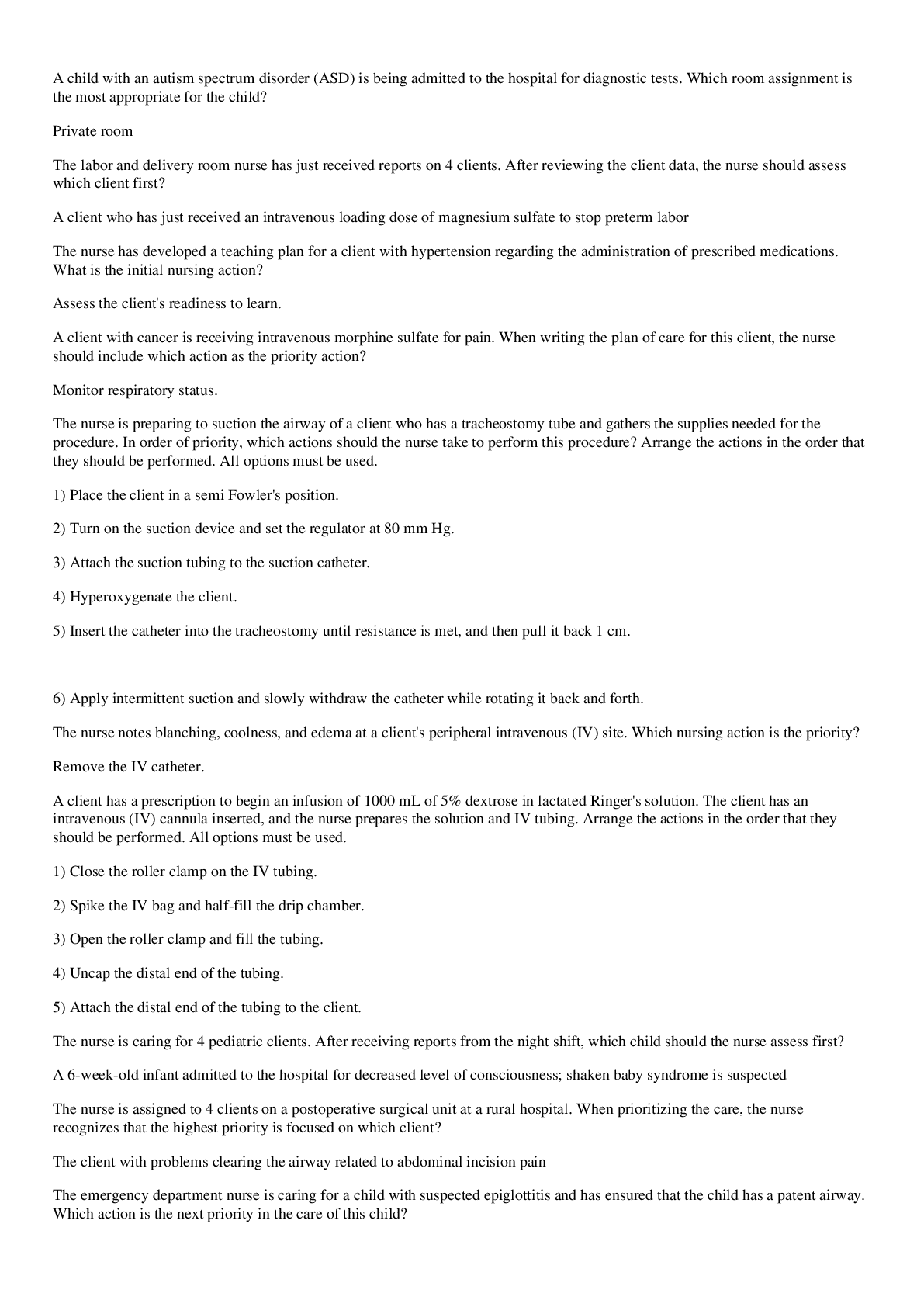
MENTAL HEALTH.png)

 (1).png)

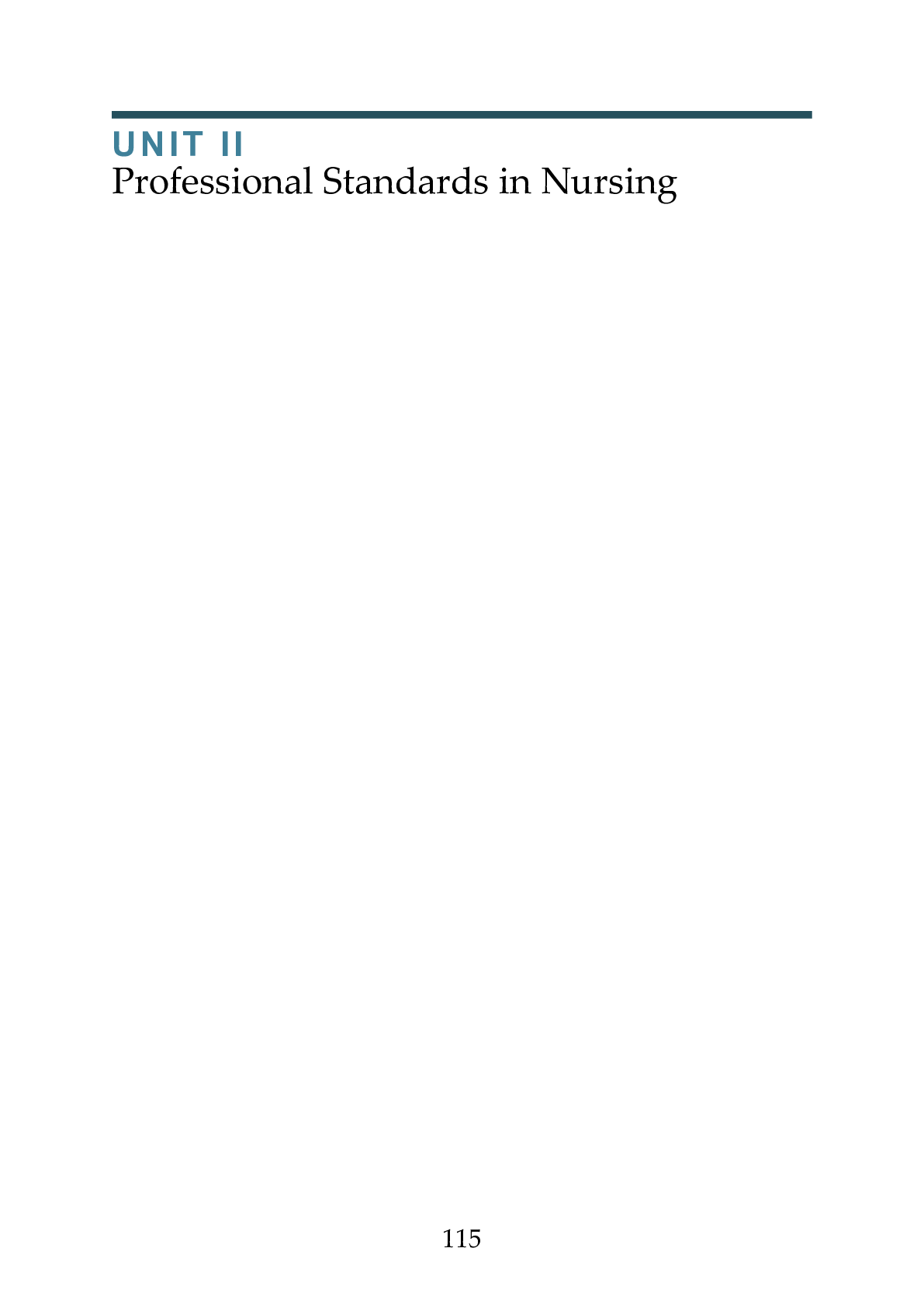
 (1).png)
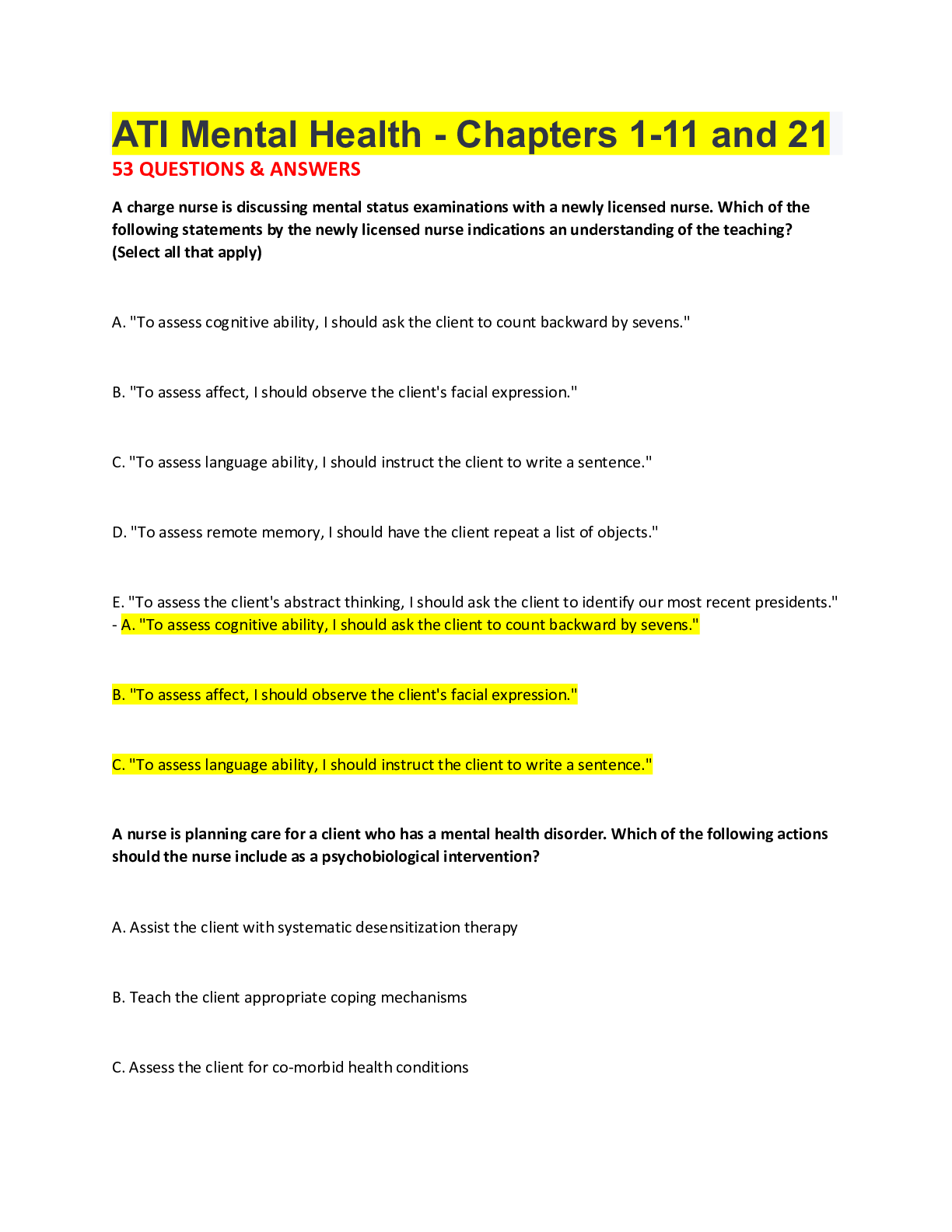
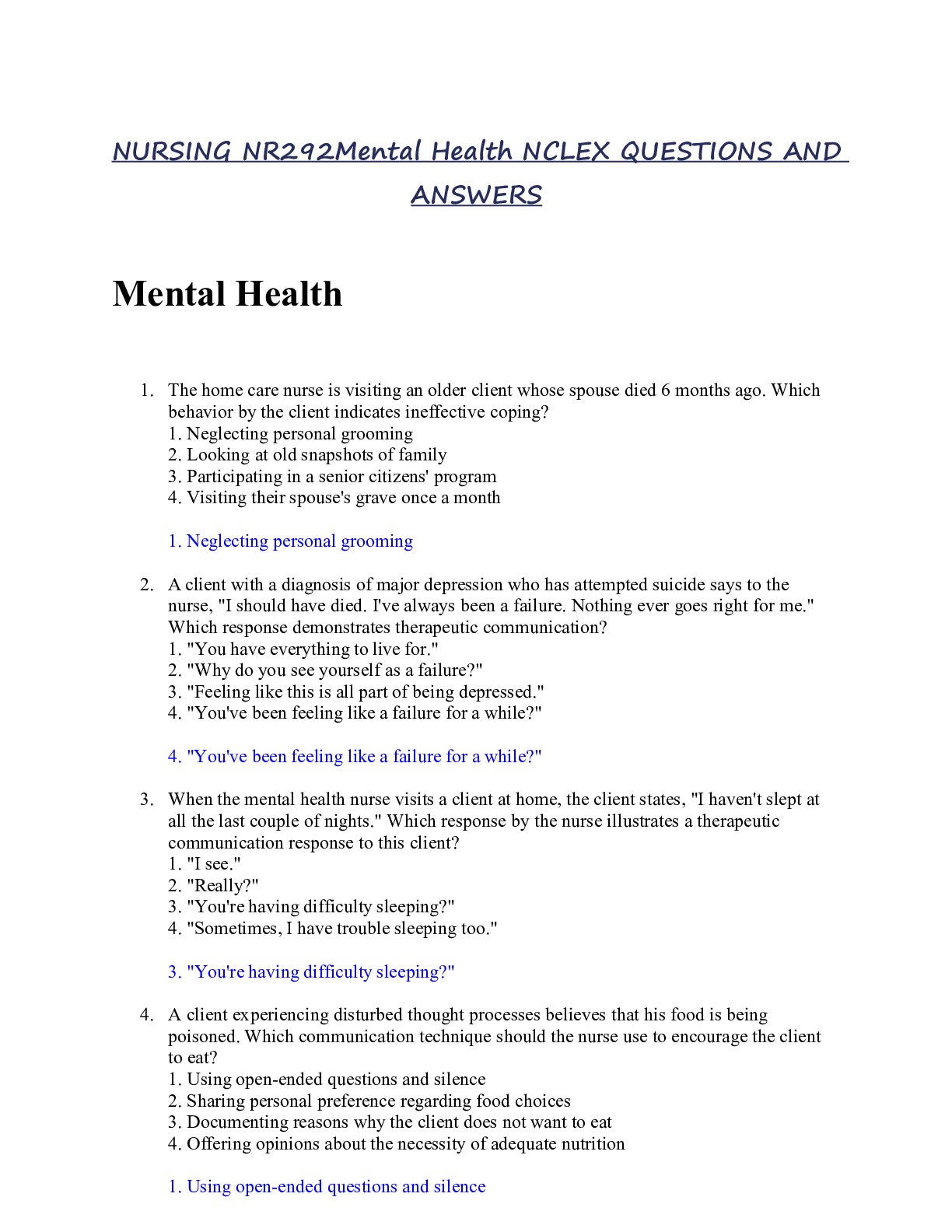
 (1).png)
